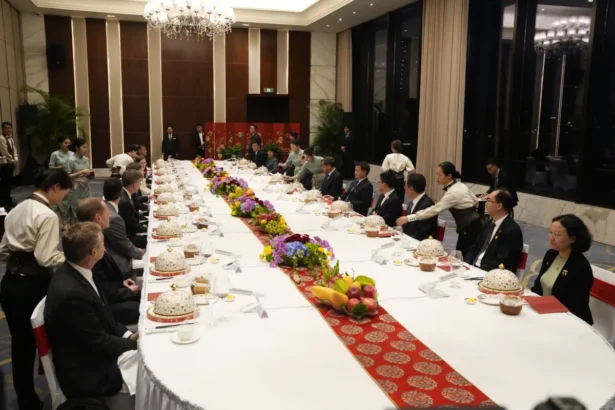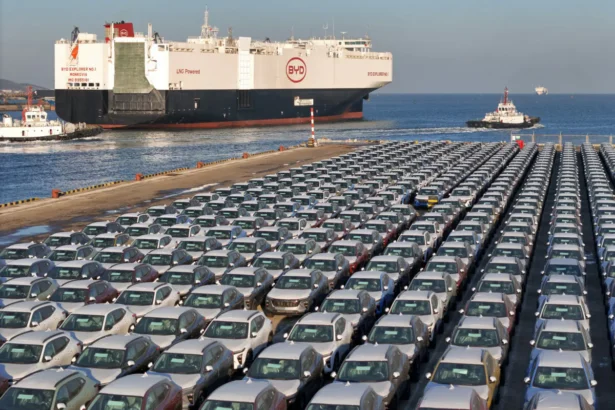U.S. Treasury Secretary Janet Yellen criticized Beijing’s “coercive” measures against foreign companies, calling on the regime’s top leadership to provide American businesses and workers “a level playing field.”
Kicking off her second trip to China as Treasury secretary, Ms. Yellen met with American and other foreign business leaders on Friday in Guangzhou, the southern export hub.
The Chinese regime has pursued “unfair economic practices, including imposing barriers to access for foreign firms and taking coercive actions against American companies,” Ms. Yellen said at an event hosted by the American Chamber of Commerce in China (AmCham).
According to the annual survey by the Beijing-based AmCham, a third of U.S. companies said they were treated unfairly by local policies and enforcement actions compared to their Chinese competitors. The largest decline in equality was reported in the technology and research and development (R&D) sector.
“I strongly believe that this doesn’t only hurt these American firms: ending these unfair practices would benefit China by improving the business climate here,” Ms. Yellen said. “I intend to raise these issues in meetings this week.”
During an earlier meeting with Wang Weizhong, the provincial governor of Guangdong, Ms. Yellen emphasized the need for “a level playing field” for American workers and companies.
Chinese Communist Party (CCP) officials have pledged to offer foreign companies the same as their domestic competitors. However, in recent years, a series of raids, heavy fines, arrests, and convictions of staff of international consultancies and due diligence firms have weighed on foreign investor sentiment.
Foreign direct investment in China has tumbled to its lowest level in 30 years. According to China’s official data released on Feb. 18, inbound investment totaled $33 billion last year, down 82 percent from 2022.
On Feb. 27, Beijing adopted the amended state secrets law, expanding the already broad scope of information that authorities deem sensitive. The updated law on state security—on top of the regime’s increasing scrutiny of data control and espionage—risks further heightening concerns among foreign companies.
Overcapacity
Later on Friday, Ms. Yellen met with China’s new economic czar, Vice Premier He Lifeng, who oversees two powerful CCP organs overseeing the country’s financial and economic policies.
Ms. Yellen told Mr. He that it’s crucial for the world’s two largest economies to “closely communicate on issues of concern such as overcapacity and national security-related economic actions.”
“A healthy economic relationship must provide a level playing field for firms and workers in both countries,” she reiterated ahead of a closed-door meeting.

The primary focus of her trip was to urge Beijing to tackle industrial overcapacity, which the Treasury Secretary stated was a concern for the United States and other countries due to its potential for “global spillovers.”
Facing an ongoing property crisis and weak household consumption, China is pouring money into the manufacturing sector, shifting policy focus toward what it calls the “new three” growth areas of electric vehicles, lithium-ion batteries, and photovoltaics—which results in excess manufacturing capacity in the country.
“Direct and indirect government support is currently leading to production capacity that significantly exceeds China’s domestic demand, as well as what the global market can bear,” Ms. Yellen said at the same AmCham event.
“Overcapacity can lead to large volumes of exports at depressed prices,” she said, adding that it harms workers and businesses in the United States, India, and Mexico.
Moreover, she said, “It can lead to overconcentration of supply chains, posing a risk to global economic resilience.
“I believe that addressing over capacity, and more generally considering market-based reforms, is in China’s interest.”
After Friday’s economic dialogues and working dinner, Ms. Yellen and Mr. He are expected to have another meeting on Saturday morning. Ms. Yellen and her team will then head to Beijing to meet Chinese Premier Li Qiang and several high-level CCP officials.
A New Trade War?
However, outside observers are not optimistic about addressing China’s massive production.
Steven Mosher, president of the Population Research Institute and author of a new book, “The Devil and Communist China,” noted the CCP’s industrial overcapacity is not a new issue, calling it “a direct result” of the years of huge state subsidies in sectors that Beijing wants to dominate.
Persuading China to solve the overcapacity issue would be like changing the economic model they’ve been using for decades to “crush the industrial base of the United States and Europe,” Mr. Mosher told NTD, the sister media outlet of The Epoch Times, during an interview on Thursday.
Unless Ms. Yellen’s dialogues with Chinese officials are “accompanied by very hard and tough trade negotiating tactics, including the possibility of increased tariffs, I don’t think she’s going to get anywhere,” he added.

Sun Kuo-hsiang, a professor of international relations at Nanhua University in Taiwan, expressed similar viewpoints, cautioning Ms. Yellen and her team are likely to face tough talks with the CCP officials.
In the Western economy, “factories’ production is based on the consumers’ demand, which is in contrast to China,” Mr. Sun told The Epoch Times on Thursday. “As a communist country … China will keep making products regardless of whether there are orders or not. If there are excess goods, manufacturers would seek to sell them overseas and lower their prices.”
Beijing’s use of state subsidies to grant its domestic businesses a significant competitive advantage in the clean energy sector, along with its exportation of industrial overcapacity to overseas markets, could further escalate trade tensions with the West, Mr. Sun warned.
“It risks triggering a new trade war in the green energy industry,” he added.
Wang Guo-Chen, an assistant research fellow at Taipei-based Chung-Hua Institution for Economic Research, disagrees with Mr. Sun, saying that Washington and Brussels are likely to ramp up their anti-dumping efforts against Beijing.
Mr. Wang referred to the “small yard, high fence” analogy that the Biden administration officials often used to describe their approach of restricting critical U.S. technologies while allowing most commercial ties with China to continue.
“The ‘fence’ will become higher,” he said. But “it won’t reach the level of a trade war.”
Luo Ya contributed to this report.
From The Epoch Times
